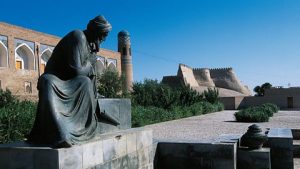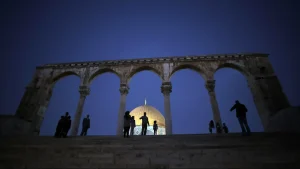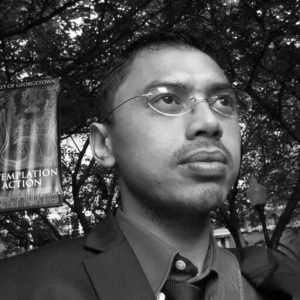Ehsan Shahwahid || 27 February 2024
 Intellectuals and scholars have discussed the problematics of colonization, modernity and knowledge production, which led to several initiatives undertaken to disentangle these legacies of the West still prevailing towards Islam, Muslims, and more broadly the whole world. Among the notable initiatives that have emerged; Islamisation of Knowledge and Critical Muslim Studies are discussed here in conversation with one another, with reference to Malaysia.
Intellectuals and scholars have discussed the problematics of colonization, modernity and knowledge production, which led to several initiatives undertaken to disentangle these legacies of the West still prevailing towards Islam, Muslims, and more broadly the whole world. Among the notable initiatives that have emerged; Islamisation of Knowledge and Critical Muslim Studies are discussed here in conversation with one another, with reference to Malaysia.
The discussion towards Islamisation of Knowledge took place during the First World Conference on Muslim Education held in Mecca in 1977 that resulted in a list of recommendations, including the need to pursue the Islamisation project in all areas of knowledge perceived to be problematic due to Western influences. A master plan, ‘Islamization of Knowledge: General Principles and Work Plan’, was produced, which led to the establishment of the International Institute of Islamic Thought (IIIT) in 1981 as the leading agency to drive the project ahead. Ever since, the Islamisation project has been seen in operation through academic works produced by IIIT with associated scholars and also through the further establishment of various institutions globally related to the Islamisation project.
Critical Muslim Studies could be seen as another project responding to the ordering of knowledge in a West-dominated world, where Muslimness is usually sidelined. The increasing interest in the academia towards Muslims since the later part of the 20th century has been mostly constrained to ethnic or international area studies, with inadequate presentations of Muslimness. In academia, which lacks the theoretical tools with prevailing Eurocentric conceptions, ‘Islam’ and ‘Muslims’ could not easily be adopted within the standard categorization, either of religion, ethnicity, or nation. Within these settings, Critical Muslim Studies emerges as a space for conversation on Muslimness.
The Islamic problem, or the Muslim question?
 What is the problem, or the key question to be resolved? The Islamisation project sees the problem of knowledge as part of the dire conditions of the Umma; political weakness, economic insufficiencies, cultural westernization, corruption of self and society; and the core problem lies with the education of Muslims.
What is the problem, or the key question to be resolved? The Islamisation project sees the problem of knowledge as part of the dire conditions of the Umma; political weakness, economic insufficiencies, cultural westernization, corruption of self and society; and the core problem lies with the education of Muslims.
There can be no doubt that the intellectual and methodological decline of the Umma is the core of its malaise. The educational system is the breeding ground of the disease. (IIIT 1989: p. 5).
The education imposed towards Muslims is described as western in spirit, comprises problematic traits of being western, modern, secular and nationalistic, and in contradiction to what that is perceived to be Islamic.
The dominant form of Western education imposed towards Muslims, on top of the continuous learning of Islam, have led to the problem of educational dualism, perceived as knowledge division between the Western and the Islamic. The over-arching solution called for by the project is the need towards integration of the divided forms of knowledge, and the need for an Islamisation of knowledge.
On the other hand, Critical Muslim Studies locates the epistemological not only in knowledge per se, but more in the ordering of knowledge, being part of the broader world itself. The centuries-long domination of the world by Western powers has shaped the ordering of knowledge comprising influences of Eurocentrism, orientalism, and positivism that can be seen as part of the formation of modernity, on top of various legacies of colonialism that remain in place. Realizing the problematic elements in the knowledge and world order, Critical Muslim Studies plays a role in clearing the ground, destabilizing the knowledge-world order, and opening up spaces for the Muslim question and key interventions regarding Muslimness that can be put in place.
Epistemological Positions: The Islamic and the Critical
As the Islamisation project sees the problem with educational dualism, therefore integration is required to develop a synthesis between the knowledge of Islam and of ‘the West’. In doing so, the integration strategy undertaken is by a screening process of ‘eliminating, amending, reinterpreting, and adapting’ in order to extract the ‘good aspects’ from the Western/modern knowledge, while re-discovering the intellectual legacies of the Muslims’ past that could still be useful. Thus, a new integrated epistemological position is required as a form of knowledge that can be considered Islamic.
The ‘First Principles to an Islamic Methodology’ is produced comprising what is perceived as the essential principles of Islamic knowledge presented as a set of unities; unity of Allah, unity of creation, unity of truth/knowledge, unity of life/humanity, and the complementary relation between revelation and reason.
Critical Muslim Studies takes key critical epistemological positions towards the meta-narratives of modernity and Euro-centrism, coloured by its suspicion of positivism, and critique towards orientalism. It also embraces decolonization as the condition of the world is still very much shaped by legacies of the colonial past.
Ontic/Ontological Manifestations
 The construction of ‘the Islamic’ as an epistemological and methodological category as applied in the key principles of Islamisation, with its description of criteria and parameters may appear as an ontic presentation of the Islamic. This ontic criteria for an Islamic system then are used in engaging with knowledge of the modern-West, in dialectical ways forming the integrated synthesis of an Islamicised Knowledge that manifests in various fields and disciplines of the Islamisation project; Islamic education and universities; Islamic economics and finances; Islamic psychology and human sciences, etc.
The construction of ‘the Islamic’ as an epistemological and methodological category as applied in the key principles of Islamisation, with its description of criteria and parameters may appear as an ontic presentation of the Islamic. This ontic criteria for an Islamic system then are used in engaging with knowledge of the modern-West, in dialectical ways forming the integrated synthesis of an Islamicised Knowledge that manifests in various fields and disciplines of the Islamisation project; Islamic education and universities; Islamic economics and finances; Islamic psychology and human sciences, etc.
However, critical challenges are faced, especially when the critique towards the problematic knowledge of the West is not rigorous enough, that the Islamicised knowledge could be easily trapped within the knowledge order of the dominant West, thus not necessarily capable of providing solutions to the problems of Muslims’ education.
Here, the critique mounted by Critical Muslim Studies becomes crucial as the problem is not simply in terms of epistemology but much broader in the ordering of knowledge of the world, and the need to scrutinize the episteme of the modern contemporary world where the conditions for the possibility of knowledge are formed, systematized and established to the point that arguably no forms of knowledge could escape, including the Islamicised knowledge.
Such a venture could only manifest by putting forward the critique in a way that goes beyond the ontic, into the ontological, with the positioning of Muslims’ subjectivity against the problematics of the Westernese. Critical Muslim Studies works through critical positions and narratives, and in being critical working against the knowledge structure towards changing and the reorienting of the world.
Islamisation: The Malaysian Experience
Islamisation of Knowledge project has achieved certain milestones, though quite far short of its earlier expectations of its proponents. Saqeb (2000) explains the failure of this project to achieve its goals is due unwillingness of governments of Muslimistan to implement their commitments for the advancement of the project, though with one interesting exception;
“The only exception to this indifference, stands out to be the case of Malaysia where the government took the Conference decisions seriously and have implemented the Islamization of education programmes at all levels. (Ghulam Nabi Saqeb2000: p. 64)”
The exceptional case of Malaysia as an Islamisation of Knowledge success story project can be seen with the establishment of several Islamic higher learning institutions, particularly the International Islamic University Malaysia (IIUM). In fact, Islamisation do appear to have advanced itself beyond the educational into other spheres of the Islamic public life; legal-governance, economics/finances, politics, culture, media, etc.
However, the advancement of Islamisation takes place without the emphasis on criticality, thus thwarting its recuperation in the neo-liberal world order. Even more concerning when elements of ‘the Islamic’ are too easily used in retaining, conserving, and fashioning the world and knowledge order, while commitments towards social justice and ummatic solidarity remain elusive. Here, Critical Muslim Studies becomes helpful in recognizing the colonial foundations and Westernese ordering of the world-knowledge system and subsequently providing a critique to its intertwining influences towards the Islamisation project.
References:
Saqeb, G. N. (2013) “Some Reflections on Islamization of Education since 1977 Makkah Conference: Accomplishments, Failures and Tasks Ahead”, Intellectual Discourse, 8(1).
International Institute of Islamic Thought (IIIT). 1989. Islamization of Knowledge: General Principles And Work Plan. International Institute of Islamic Thought (IIIT). Herndon, Virginia, U.S.A.
ReOrient: A Forum for Critical Muslim Studies. 2015. Vol. 1(1), pp. 5-10.
Vakil, A. and Sayyid, S. 2021. Genealogy of Critical Muslim Studies. Radio ReOrient. [Podcast]. [Accessed 1 December 2023]. Available from: https://criticalmuslimstudies.co.uk/project/genealogy-of-critical-muslim-studies/
 Ehsan Shahwahid is a post-graduate research student at the School of Sociology & Social Policy, University of Leeds. He was a socio-political researcher at Merdeka Centre and prior to that a Program Manager at the Islamic Renaissance Front (IRF). He holds a master’s degrees in Sociology from National University of Malaysia (UKM) and in Religion and Public Life from University of Leeds. This essay first appeared at https://criticalmuslimstudies.co.uk/project/knowledge-islamisation-and-critique-in-malaysia/
Ehsan Shahwahid is a post-graduate research student at the School of Sociology & Social Policy, University of Leeds. He was a socio-political researcher at Merdeka Centre and prior to that a Program Manager at the Islamic Renaissance Front (IRF). He holds a master’s degrees in Sociology from National University of Malaysia (UKM) and in Religion and Public Life from University of Leeds. This essay first appeared at https://criticalmuslimstudies.co.uk/project/knowledge-islamisation-and-critique-in-malaysia/

